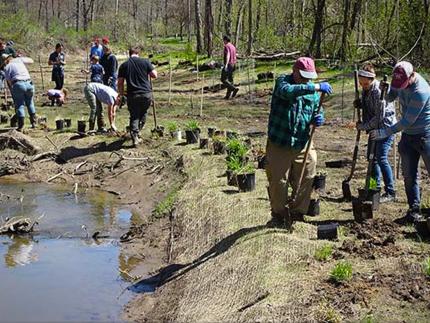Watershed Restoration Grant Awarded

Calvin University’s Plaster Creek Stewards (PCS) collaboration has been awarded a major two-year grant from the State of Michigan Department of Environment, Great Lakes, and Energy (EGLE).
The grant, with a total value of $1,018,251, will allow PCS to implement a major floodplain restoration project, expand its urban curb-cut rain garden project, and support multiple students to assist in the installation, management, and research of these efforts.
“Over the past 13 years, we've gotten to see Grand Rapids grow as a green stormwater project hot spot,” said Andrea Lubberts, PCS program manager. “The fact that we got this grant is a big deal. We are the most competitive city in Michigan when it comes to getting stormwater funding. We have great partners, we work together, we make each other better.”
Since its founding in 2009, PCS has received more than 20 major grants totaling over $5 million in funding.
These grants have had tangible results: the transformation of more than 50 acres of watershed land into natural habitat, the installation of 120 curb-cut rain gardens, and the restoration of floodplains to mitigate flooding and erosion downstream.
While these results are significant and the reason PCS was created to begin with, the work runs much deeper.
“We initially saw our work as focused on cleaning up the creek,” said Dave Warners, a professor of biology and director of PCS. “What we’ve come to realize is that what we need is changed behaviors by residents and churches and schools.”
PCS leaders say that changing behaviors comes through building relationships with residents, with churches, with schools, and with the creek.
“If we clean up the creek and no behaviors change, the creek will become decimated again,” said Warners. “We have to develop relationships and build trust, and that takes time and education.”
PCS has done that through their threefold mission of restoring the health and beauty of Plaster Creek through education, research, and on-the-ground restoration.
PCS has given 500 educational presentations and has worked with many local schools that are now incorporating local watershed projects into their curriculum. PCS has also involved more than 40 faith communities and thousands of volunteers in this hopeful work of watershed restoration.


